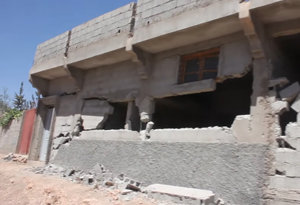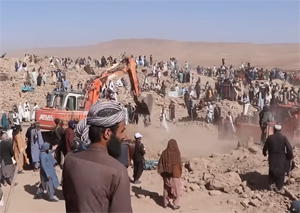14 November 2023–The devastating September 2023 earthquake in Morocco and the unusual series of October 2023 earthquakes in Afghanistan are painful reminders of the seismic hazard that exists even in slowly deforming mountain belts away from major plate boundaries. Earthquakes take place infrequently in these regions, but their impacts can be significant. In this interview with BSSA Editor-in-Chief P. Martin Mai, Mai discusses what prompted the journal to create a Special Issue dedicated to these earthquakes.
Why was it important to create this special issue?
After the initial news of the Morocco earthquake, it became clear that this event would soon be forgotten, and if forgotten, nothing could change in the local activities and approach to earthquake resiliency. It’s important that we try to raise awareness in countries that do not often experience earthquakes, because when they do, they are often very damaging and have a high death toll.

It can be important to have key papers about an earthquake event collected in one place, especially if we include papers that would not normally be published in a journal with a focus on earthquake science. When engineers or geologists publish about these events separately in other journals, they may not reach the audience of earthquake scientists who benefit from their work. A BSSA Special Issue helps to close this loop and build more research collaborations and scientific networks within the global community.
What are some of the interesting scientific questions about these earthquakes?
In Morocco and Afghanistan, the earthquakes took place in mountainous regions far away from plate boundaries—a few hundred kilometers—so the deformation rates on these faults are low. These faults therefore do not produce (large) earthquakes often, but they still accumulate stress over long periods of time. When such faults break, the consequences can be fatal. Because there was so little seismicity in the preceding decades or even centuries, the local population may not be prepared.
The Afghanistan sequence was unusual because it had four earthquakes, almost the same size within a few days. That is of interest to scientists who want to understand the causes and consequences of such earthquake behavior, and whether there are other places on the globe where similar events can happen, too.
What kinds of manuscripts would you like to see submitted for the special issue?
We are looking for papers across a broad range of disciplines, including reconnaissance and observational papers by the initial teams on the ground. It would be great if papers are submitted on the local and regional geology or seismotectonics as well as general studies on the topic, because these earthquakes illustrate that we need to know more about earthquakes in slowly deforming mountain belts. It may be that local experts have published on these topics, but in journals that the larger community is not aware of. We hope to motivate these scientists to contribute to this Special Issue.

It would also be good to receive manuscripts on the engineering and social science side, to learn more about how people build and how the populations dwell in these areas, and how this might have contributed to the large numbers of fatalities in remote areas with small villages.
What is BSSA doing to help local researchers contribute to the special issue?
We know that researchers in both regions are focused on rebuilding their lives and ensuring the safety of their families and colleagues, first and foremost. For this reason, we allow submissions for a period of seven months, longer than usual, for the special issue. We think it is important to accommodate the needs of the local scientists on the ground in Morocco and Afghanistan to be able to piece together their stories.
Authors with financial hardships may explore help with publication fees through our waiver program.
SSA has also partnered with American Journal Experts, Inc. (AJE) to provide English language editing for our authors at a discounted rate. Authors can receive a 20% discount on AJE’s services by visiting their website and registering for an account. The discount will be automatically applied when using this link.
